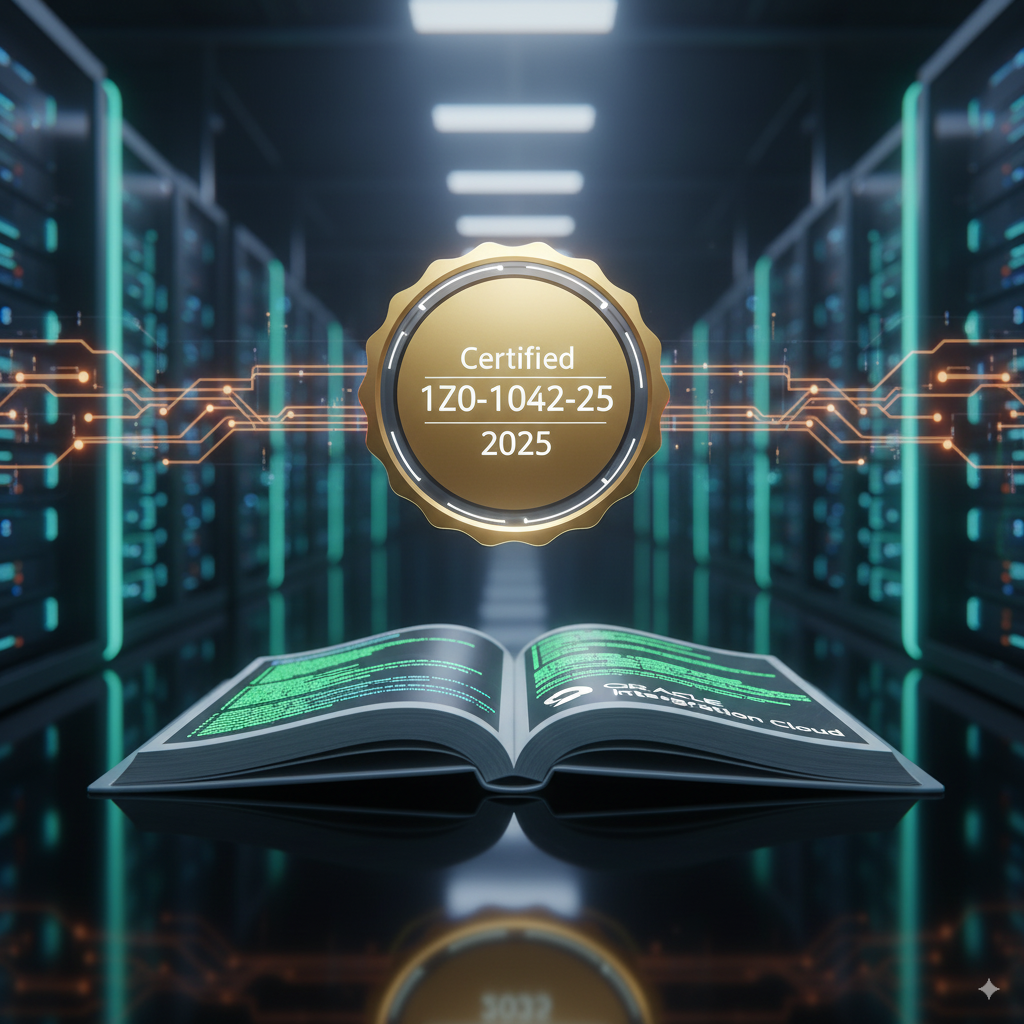
Quick Summary for Oracle Integration Cloud Certification Exam
- To pass the Oracle Integration Cloud certification exam (1Z0-1042-25), focus your study on Creating Orchestrated Integrations, which constitutes 40% of the total score.
- The exam consists of 50 questions requiring a passing score of 68% within 90 minutes.
- Success requires hands-on experience with OIC connections, adapters, and fault handling rather than just theoretical knowledge.
- Earning this certification validates professional expertise in cloud integration and supports salary potential averaging $89,000.
- Candidates should prioritize practical application using the OIC Data Mapper and troubleshooting tools to ensure readiness.
Ready to advance your career in cloud integration? The Oracle Cloud Infrastructure 2025 Certified Application Integration Professional certification (1Z0-1042-25) is your gateway to demonstrating expertise in Oracle Integration Cloud (OIC). This comprehensive guide covers everything you need to know to pass the exam and excel in application integration.
What is Oracle Integration Cloud (OIC)?
Oracle Integration Cloud (OIC) is a comprehensive cloud-based integration platform that enables organizations to connect their cloud and on-premises applications seamlessly. As businesses increasingly adopt hybrid cloud strategies, OIC serves as the critical bridge that ensures smooth data flow and process automation across diverse systems.
For more information about OIC checkout this book on Amazon
Exam Overview: 1Z0-1042-25
The Oracle Cloud Infrastructure 2025 Certified Application Integration Professional certification validates your ability to leverage Oracle Integration Cloud for designing and implementing both cloud and on-premises application integrations.
Who Should Take This Exam? This certification is ideal for application integrators with at least one year of hands-on OIC implementation experience or those who have completed the “Become an Application Integration Professional” Learning Path training.
Exam Objectives and Weightings
| Exam Objectives | Percentage of Exam |
|---|---|
| Getting Started with OIC Integrations | 18% |
| Using OIC Connections and Adapters | 21% |
| Creating Orchestrated Integrations | 40% |
| Creating Scheduled Integrations | 11% |
| Testing, Monitoring, and Troubleshooting Integrations | 16% |
Detailed Exam Topics Breakdown
1. Getting Started with OIC Integrations (18%)
- Describe the Key Components of the OIC Integration Feature – Understanding the core architecture and components.
- Explain OIC Integration Concepts – Master fundamental integration patterns and design principles.
- Summarize How Integrations Work – Comprehend the end-to-end integration process.
- Discuss Web Services Fundamentals – Deep dive into WSDL, SOAP, REST, and JSON technologies.
2. Using OIC Connections & Adapters (21%)
- Create OIC Connections – Establish secure, reliable connections.
- Configure Trigger Connections – Set up connections that initiate integration flows.
- Configure Invoke Connections – Implement connections that call external services.
- Describe the Connectivity Agent – Secure on-premises system integration.
3. Creating Orchestrated Integrations (40%)
This is the most heavily weighted section.
- Manage OIC Lookups – Create and maintain lookup tables.
- Use the OIC Data Mapper – Master the visual data mapping tool.
- Use Custom JavaScript Libraries – Implement custom logic and transformations.
- Add and Configure Orchestration Flow Actions – Design complex integration flows.
- Implement File Handling Options – Work with various file formats.
- Leverage the Fault Handling Framework – Implement robust error handling.
4. Creating Scheduled Integrations (11%)
- Define an Integration Schedule – Set up time-based triggers.
- Convert a Scheduled Integration to App-Driven – Transform batch processes into real-time.
- Use Scheduled Parameters – Implement dynamic configuration options.
5. Testing, Monitoring, and Troubleshooting Integrations (16%)
- Activate & Deactivate Integrations – Manage integration lifecycle.
- Test REST Trigger Connection-Based Integrations – Validate functionality.
- Import & Export Integrations – Implement migration strategies.
- Monitor & Troubleshoot Integration Instances – Use OIC monitoring tools.
Ready to Get Certified?
Success requires a combination of theoretical knowledge and hands-on experience. Focus your preparation on the heavily weighted “Creating Orchestrated Integrations” section.
Study Tips for Success
- Hands-On Practice: Set up a trial OIC environment.
- Focus on High-Weight Topics: Spend 40% of study time on orchestrated integrations.
- Understand Web Services: Master REST, SOAP, JSON, and WSDL.
- Practice Data Mapping: The OIC Data Mapper is crucial.
- Learn Troubleshooting: Know how to monitor and debug.
Official Exam Reference: Oracle Certification Link
Conclusion
The Oracle Integration Cloud certification is a valuable credential for modern cloud professionals. By focusing on the objectives outlined above, you will be well-positioned to pass the 1Z0-1042-25 exam and advance your career.
People Also Asked (FAQs)
1.What is the passing score for the Oracle Integration Cloud certification exam?
The passing score for the 1Z0-1042-25 exam is 68%. Candidates must answer approximately 34 out of 50 multiple-choice questions correctly within the 90-minute time limit to achieve certification.
2.How much does the Oracle Integration Cloud certification exam cost?
The exam typically costs $245 USD. Prices may vary slightly by region or currency. Oracle sometimes offers free certification promotions, so check the official Oracle University website for active discounts.
3.What is the average salary for an Oracle Integration Cloud certified professional?
Certified professionals in the US earn a median salary of approximately $89,000, with top earners reaching over $115,000 annually. Compensation varies based on experience, location, and specific role requirements.
4.How long is the Oracle Integration Cloud certification valid?
Oracle Cloud Applications certifications are generally valid for 18 months. Professionals must often pass a shorter ‘Delta’ exam or complete continuing education requirements before the expiration date to maintain their active status.
5.Are there prerequisites for the Oracle Integration Cloud certification?
While there are no official prerequisites, Oracle recommends at least one year of hands-on experience with OIC. Completing the ‘Become an Application Integration Professional’ learning path is also highly suggested.
6.How many questions are on the 1Z0-1042-25 exam?
The exam consists of 50 multiple-choice questions. You have a total of 90 minutes to complete the exam, meaning you have slightly less than two minutes per question.
7.Is the Oracle Integration Cloud certification exam difficult?
The 1Z0-1042-25 exam is considered professional-level difficulty. It tests practical skills, not just theory. With 40% of the exam focused on complex orchestrated integrations, hands-on lab practice is essential for success.
8.Can I take the Oracle Integration Cloud exam online?
Yes, you can take the exam online through Oracle’s testing partner, Pearson VUE. It requires a proctored environment where you are monitored via webcam to ensure exam integrity.
9.Which topic carries the most weight in the Oracle Integration Cloud exam?
The most heavily weighted topic is ‘Creating Orchestrated Integrations,’ which accounts for 40% of the total score. Mastering data mapping, lookups, and fault handling in this section is critical for passing.
10.What happens if I fail the Oracle Integration Cloud certification exam?
If you fail, you must typically wait 14 days before retaking the exam. You will need to pay the exam fee again for the retake unless you have a specific retake voucher.



